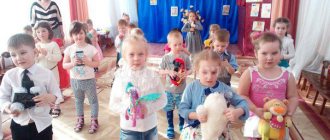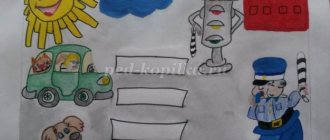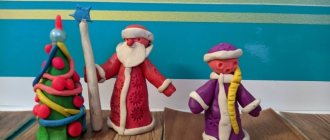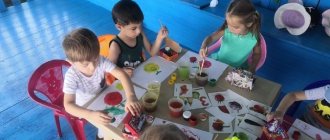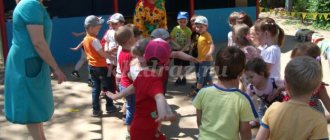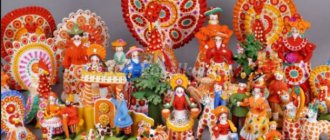Summary of a health event with parents of the middle group “Fun Starts”
NATALIA BASYROVA
Summary of a health event with parents of the middle group “Fun Starts”
Summary of a health event with parents of secondary group No. 2.
«Fun starts»
— To promote in parents and children a feeling of joy and pleasure from joint motor and play activities;
— Develop moral and volitional qualities (speed, dexterity, attention)
;
- create a healthy family lifestyle.
Equipment: hoops, balls, gymnastic sticks, soft and flat modules, skittles, baskets, models of vegetables and fruits.
To the sounds of the march, children and their parents enter the hall .
Team Arrow
.Team motto:
“To grow and strengthen ourselves, we will play sports.
Toughen up, kids, in good time - physical education - hurray!
Team "Rocket"
.Team motto:
“We will break all records and we will replace the champions very soon!”
Host: Dear friends! It’s great that we all came together for the “ Fun Starts ”
.
Presenter: Let's see whose team is faster (the child is first, the mother holds on to him, they run like a snake without touching the pins, running around the landmark and returning in a straight line).
Presenter: Participants get ready for the new competition “Get into the Goal”
(follow the
“footprints”
, take the ball from the hoop and get into the basket, run back).
Host: Are you tired? It wouldn’t hurt to have some refreshment, and at the same time we’ll find out “Who has the best appetite”
(on command, one team collects vegetables, the other collects fruits)
.
Presenter: Before the big final relay race, we will rest physically, but work mentally “Name the sports”
(teams take turns naming the sports)
.
— Our competition has come to an end.
Winner's reward ceremony. (presentation of certificates and refreshments for children)
.
Physical education fun “Fun Starts” for the senior group Goal: Strengthening the health of children through physical exercise and outdoor games. Objectives: Wellness: • preserve and strengthen the physical.
Synopsis of a physical education and recreation event for the middle group “In the garden, in the vegetable garden” Synopsis of the physical education and recreation event for the middle group “In the garden, in the vegetable garden” Goals: To consolidate the differentiated ones in children.
Summary of a sports and recreational event for children of primary preschool age Educator Tsyplenkova E. Z. Age group: junior. Integration of educational areas: Physical development, cognitive, speech,.
Entertainment “Fun Starts” for the middle group Objectives: 1. Form the habit of taking care of your health; instill a love of physical exercise; 2. Develop speech and movement coordination.
Holiday scenario for children of the senior group in the kindergarten “Fun Starts” Holiday script for children of the senior group in the kindergarten “Fun Starts” Objectives: to teach to act in accordance with the game rules;
Scenario of a sports festival with parents “Fun Winter Starts” Scenario of a sports festival with parents “Fun Winter Starts” Objectives: To improve the existing motor skills of children.
Scenario of sports entertainment “Fun Starts” for children of the senior group Scenario of sports entertainment “Fun Starts” for children of the senior group. Koryakina Maria Vasilievna, teacher of MBDOU D/s No. 20 “Nadezhda”.
Sports competitions for the preparatory group “Fun Starts” “Fun Starts” For the preparatory group Author: Podshibaeva Lidiya Ivanovna physical education instructor Purpose: this holiday.
Source
Joint leisure time of parents and children in kindergarten
Municipal Budgetary Preschool Educational Institution
"Kindergarten No. 15 "Rainbow"
Taganrog
Scenario
joint entertainment for children and parents on the theme “Friendly Family”
teachers: Arkhipenko L.A.
Target:
To form values about the family, to unite children and parents.
Tasks:
- Harmonize parent-child relationships through joint events.
- Establishing partnerships with families of pupils.
- Develop the child’s communication skills - free communication with adults and children.
- Creating a favorable atmosphere of goodwill and mutual understanding.
Participants:
parents, children, teachers
Preliminary work
: invitation to a holiday, exhibition of drawings of family creativity on the theme: “My Family.”
Progress of entertainment
Entertainment takes place on the kindergarten playground
.
Parents and children enter the playground to the music “My Family” - Ermolova
Educator:
Good afternoon, dear guests! We are glad to see you, cheerful and beautiful in our kindergarten! We called our event “Friendly Family”. And this is no coincidence. Family is the most important thing in life for each of us. Family is close and dear people, those to whom we wish goodness and happiness, whom we love, whom we take as an example, whom we care about.
All of you took an active part in the exhibition of family creativity “My Family”. The guys and I learned a lot about your family traditions, holidays, how you live and what you like to do. I think our children know and understand that a family begins with love, kindness, caring for each other and, of course, with home.
Houses are different. Our children also have a second home in which they spend most of the day. And now you will understand what kind of house we are talking about.
Children read poetry
1 child
The house is cozy, small - doors and windows, and from the porch itself there are paths around it
2 child
This house is beautiful, important... well, let it be that the two-story one is like a marvelous steamship sailing down the street
3 child
There is a wonderful house in the world; children are taught in that house. It seems to me that this house is the best in the world!
4 child
I come here every day, learn, grow, mature, and I always leave here a little smarter.
5 child
If you enter this house into a magical world, you will find yourself laughing merrily, and being sad and worried. This holiday will live in your soul for many days.
Educator:
Can you guess which house we are talking about? Of course about kindergarten. Here we live as one big happy family. And your children and I invite you to plunge into an ordinary day in the life of this family, or rather, become part of it. Do you agree? So let's begin!
The clock hand is at 6.00
Educator:
The morning is just coming, the alarm clock does not let me sleep. He gets everyone out of bed and everyone has a lot of worries. People, adults and children are rushing about their business. The kindergarten is shining with lights, opening its doors to us.
(turns the arrows to 8.00 am) At 8 - according to the schedule, we do exercises together
Educator:
Dear moms and dads! We invite you to morning exercises! (Children and their parents perform a musical warm-up.)
Educator:
(turns the arrows to 8.30 am):
Eight thirty is our time: We sit down to eat porridge.
Finger game “Eating Porridge” (children and parents)
Like at our breakfast we ate delicious porridge. Delicious smoky porridge with a delicious sweet pie. We took big spoons and ate the porridge all to the crumbs. This is the kind of porridge in our kindergarten!!!!
Moves the clock hands to 9 am
Educator:
And now we must get down to business quickly and boldly. Design, play, sing songs, read poetry.
Educator:
A Russian proverb says “My home is my fortress.” Why do they say this? (answers from children and adults) Each family has its own fortress - its own home. Today we invite YOU to build your own “fortress”. (construction of houses on a veranda from blocks)
(moves hands to 9.30)
Educator:
Nine thirty in the morning - It’s time for us to study. We invite you to a music lesson, here we dance, sing and play.
Dance “Smile”, “Orchestra playing musical instruments from waste material.”
Time is running forward - the third lesson awaits us (turns the clock hands to 10 o'clock)
Speech development lesson.
I invite you to listen and guess “Proverbs about Family.”
I'll start and you finish
- The apple never falls far from the tree).
- Being a guest is good, but being at home is better).
- Where there is love, and advice (there is no grief).
- The hut is not red in its corners, but (red in its pies).
- The whole family is together... (so the soul is in place).
- You don’t need a treasure if... (there is harmony in the family).
- Each hut (its own rattles).
They did a great job, well done!
(pointers move to 11.00)
And now it's time for a walk. While walking we observe the world around us. We work and, of course, play our favorite outdoor games. We invite you to play too. Dear Parents!
An outdoor game is played.
1. Roll the ball over the blanket.
(turn the clock hands to 12 o'clock)
1 child
We go to lunch together; we really need some refreshment. Our kids love chicken soup and cutlets.
Game with children “Taste the taste”, Game with parents “Give each other juice”
(blindfolded)
(clock hands at 13 o'clock)
2 reb.
The quiet hour crept up languidly, and our group became sleepy. Children close their eyes with their noses, sniffle, dream... (close their eyes, put their hands under their cheeks and sleep to slow music)
(clock hands at 15 o'clock)
3 reb
.
We woke up and cheered up, instantly cheered up. Afternoon snack, games, books, fairy tales...they won’t close their eyes anymore.
GENERAL COMMUNICATIVE DANCE “Monkeys”, “Little Engine”.
Educator:
It's so good that you all have a family!
Families are big and small.
The main thing is that there is always peace, friendship, respect, and love for each other in the family.
And the symbol of love, as the guys already know, is the beautiful CHAMOMILE flower. I suggest you make this flower together (to the music, children and their parents make a flower).
(clock hands at 18 o'clock)
4 children
The sun disappeared behind the houses, we left the kindergarten. I tell my mom about myself and the guys.
5 reb.
How we sang songs in chorus, how we played leapfrog, What we drank, what we ate, what we read in kindergarten. I tell you honestly and in detail about everything. I know that mom is interested in knowing how we live.
Educator:
Our dear mothers and fathers! We are glad that you came to us today, that we are becoming one big friendly family! Be interested in what interests your children, grow up with them, be inseparable friends, take an active part in the lives of your children, our group and kindergarten.
In closing, let me read you a poem:
Take care of each other, warm each other with kindness. Take care of each other, don't let us offend you. Take care of each other, forget the vanity and in moments of leisure, stay close together!
And now I invite you all to a flash mob.
Flash mob to the music “My Family”
Parents' response at kindergarten graduation, script for the holiday
The response from parents is an important part of the graduation party scenario in kindergarten. There are no clear criteria for what the parents’ response should be - in poetry or prose, in the form of a skit or song. In each kindergarten, parents, together with teachers, decide for themselves the response in what format they will provide to the audience at the festive performance. But it is worth noting that recently many parents give preference to unusual and original versions of words of gratitude to teachers and children, which are truly remembered for many years and give a good mood to all guests.
What response from parents to kindergarten graduation should be chosen for the holiday scenario?
So what response word should parents choose for kindergarten graduation? The answer to this question depends solely on the desires and abilities of the graduates’ mothers and fathers. The more artistic and creative personalities among them, the brighter and more interesting the parents’ number will turn out to be. Next, you will find several original options for the parents' response to the graduation ceremony in the garden.
MAGAZINE Preschooler.RF
Parents are active participants in children's parties and events at the preschool educational institution.“Preschool education is aimed at the formation of a general culture, the development of physical, intellectual, moral, aesthetic and personal qualities, the formation of prerequisites for educational activities, the preservation and strengthening of the health of preschool children”
It is in preschool age that health is formed and personality development occurs.
The family occupies a central place in the formation of a child’s personality. According to researchers, it is on this that 70% depends on how a person will grow up and what character traits will shape his nature. In the family, the child receives primary skills in perceiving reality and learns to recognize himself as a full-fledged representative of society. This is exactly what the “new philosophy” of working with families brings us to: parents are responsible for raising children and their development, and all other social institutions (including preschool institutions) are called upon to promote this. Family and preschool are two important institutions for the socialization of a child. And although their educational functions are different, their interaction is necessary for the comprehensive development of the child.
Organizing interaction with parents is a very difficult job. Throughout the school year, the parents of our students show interest in the life of our kindergarten. Now they not only come to joint events, but also begin to participate in their preparation and conduct.
A holiday in kindergarten is joy, fun, celebration, which is shared by both adults and children.
Festive events allow children, parents and teachers to have fun.
Working with parents in preparation for matinees and holidays turned out to be not only in demand and useful, but also attractive. This is explained by the fact that in a joint event parents have the opportunity to:
- see your child's problems from the inside
- see difficulties in relationships
- gain experience interacting not only with your child, but also with other parents.
- stand on the same level with your child, return to childhood.
To make these events educational for children and parents, I have developed an algorithm for preparing for the holidays:
- drawing up a plan for children's parties and the participation of parents in them
- involving parents in participating in activities with children
- preparation of event scenarios
- selection and learning of repertoire with children
- distribution of roles between event participants
- selection of costumes
- decoration of the hall in the preschool educational institution
- preparation of individual performances (learning poems, dances, songs)
- production of attributes
- individual meetings and rehearsals.
When preparing holiday scenarios, I immediately think about the participation of parents. Parents get involved at the role distribution stage. They choose their own roles, learn them with great pleasure, and are very creative in their character and costume preparation.
It all started very simply. Our complex traditionally hosts the Festival of Nations in the fall. It was originally conceived as an event for children, run by parents. These are master classes, conversations about a country, its traditions, costumes, national cuisine. The final event was held in the form of a concert. Children are spectators, parents are artists who represent their country. It could be a fragment of a puppet show based on a national fairy tale, a musical scene, a dance or a song. The children were delighted. Parents too. This gave us the impetus to further involve parents in our holidays. We began to hold the Festival of Nations with the help of children. We got acquainted with different countries and national traditions. The final event is the holiday “Travel across Countries” . Children “travel” to different countries: they prepare dances, songs, an orchestral performance, but one of the countries is represented by their parents - a surprise moment for the children. (Fig. 1)
We actively involve parents in New Year's parties. Children prepare songs, dances, poems, but the script is a mystery to them. The New Year's holiday is somewhat reminiscent of a quest: children do not know where they will end up and who they will meet. The main characters of the New Year holidays - parents - choose their own roles. They do this at will and with pleasure. For children it is a surprise and joy.
Everyone's favorite holiday is Victory Day! We hold it in the form of a halt, on the site. And, of course, the active participation of parents.
Involving parents in children's parties is very important both for the children and for themselves. Children and parents become closer. Parents not only look at their children, film them on their phones, they stand with them on the same stage, on the same playground, and immerse themselves in the same atmosphere. And what could be better than a festive atmosphere?
Bibliography:
- Education Law Article 64 Pre-school education
- Davydova O.I., Bogoslavets L.G., Mayer A.A. Working with parents in kindergarten: An ethnopedagogical approach. - M.: TC Sfera, 2005. - 144 p. — (Appendix to the journal “Preschool Education Management” ).
| Next > |
An unusual response from parents at a kindergarten graduation, video
If you have chosen an unusual response from your parents at your kindergarten graduation, we recommend that you take a closer look at the following formats. Firstly, the most unusual response to kindergarten graduation for teachers and children from parents can be prepared in the format of a congratulatory video. This can be either a beautiful video with poems and photographs, or an entire theatrical production for educators. Secondly, an excellent option for an unusual response is a speech from parents. You can put on a fiery dance number, prepare a skit about the everyday life of kindergarteners, or sing a funny song-remake. Find more ideas for unusual responses for parents below.
Ideas for an original and unusual response from parents at kindergarten graduation
Children's and parent's holidays as a form of work with parents
CHILDREN AND PARENTS HOLIDAYS AS ONE OF THE FORMS OF COOPERATION between preschool educational institutions and families
In the context of the development of preschool education, the teacher needs to realize the importance of cooperation with the family to create a unified space aimed at the comprehensive development of the child. The solution to this problem becomes especially relevant with the release of the federal state educational standard for preschool education, which states that “the total volume of implementation of the basic general education program includes the time allocated for interaction with children’s families.”
For most parents, a child is the highest value in life, their pride, the object of their love and care. At the same time, as practice shows, parents experience a lack of interest in what happens in kindergarten; many of them mistakenly consider preschool childhood to be not such a significant period for the development of a child’s personality. In order to teach parents to see their child as a full member of society, it is necessary to build relationships between the preschool institution and the family on the basis of cooperation and interaction.
Cooperation is communication on equal terms, where no one has the privilege to indicate, control, or evaluate [2]. The success of cooperation depends on the extent to which both parties (family and kindergarten) understand the purposefulness of the impact on the child and trust each other.
The interaction of a preschool educational institution and the family is understood as a way of organizing joint activities of parents and teachers on the basis of communication, which allows the family to be involved in the psychological and pedagogical process.
According to O. A. Safonova, one of the indicators of the quality of work of a preschool educational institution is the variety of forms of cooperation with the family, among which traditional and non-traditional ones are distinguished [3].
As research by T. N. Doronova has shown, 86% of parents consider joint activities (games and competitions) to be the most acceptable forms of interaction between preschool educational institutions and families [2]. This is due to the fact that a frequently experienced positive emotion in a person is interest, and the one experiencing this emotion has a desire to expand the experience by including new information. Therefore, based on the parents’ emotion of interest, additional motivation for visiting the institution is formed.
One of the most interesting and non-traditional forms of interaction is joint child-parent holidays, which today are a tradition of the group. They do not just serve as entertainment for children and parents, but are joint events aimed at showing parents how to properly organize children's leisure time, teaching them to communicate not only with their child, but also with his peers. This form of interaction helps to unite the child-parent team of the group, makes it possible to see and evaluate the level of social confidence of the child’s behavior in a group of peers and adults, introduce parents and involve them in the life of children in an educational institution, and optimize child-parent relationships.
Holidays are held once a quarter in accordance with the season and a comprehensive thematic plan (“Autumn Gatherings”, “Carols”, “Snowman’s Surprises”, etc.) and with the participation of all subjects of the educational process: parents, children, teachers.
The theme of parent-child holidays is selected on the initiative of both the teacher and parents and children, who most often offer such events as “Klepa visiting the guys”, “Our friend Carlson”, “Birthday once a year”, etc. .
Thematic, calendar, sports, and folk joint holidays are based on the author’s idea of the teacher. The role of parents is their direct participation in the event, preparing a festive tea party and organizing a game program; they are also involved in writing scripts, designing stage images and costumes, and making scenery.
Any parent-child holiday consists of four parts:
– theatrical performance,
in which all subjects of the educational process can show their acting skills;
– general tea drinking,
for which the table is set in accordance with the theme of the holiday;
– games and competitions
for children and adults with active, singing, intellectual and comic content;
– reflection,
which reflects the attitude of participants in the educational process towards joint activities.
The success of such events becomes more significant when teachers and parents become allies in ensuring children's emotional well-being, social confidence and creativity.
This activity involves close interaction not only with the group teacher, but also with the music director and the administration of the preschool educational institution. When preparing and holding holidays, a differentiated approach is taken to parents and children; the most relaxed and artistic ones participate in director’s productions, while others participate in organizing the game program and decorating the premises where the holiday is held.
Thus, the use of such a form of cooperation between the preschool educational institution and the family, such as parent-child holidays, helps to build positive and sincere relationships between participants in the educational process, and helps convince adults that their participation in the life of the kindergarten is necessary and necessary for both their child and for themselves.
The organization of work with families shows in a new way that a child-adult community is created on the basis of the emotional and psychological involvement of each participant in the educational process, which is characterized by an informal type of relationship and the emergence of common interests and values, and also makes it possible to carry out pedagogical activities in an open environment. systems.
Bibliography
1. Bogomolova Z. A. Formation of partnerships between teachers and parents in the conditions of cooperation of preschool educational institutions. – Preschool pedagogy. – 2010. – No. 2.
2. Davydova O. I., Bogoslavets L. G., Mayer A. A. Working with parents in preschool educational institutions: an ethnopedagogical approach. – M.: Sfera, 2006.
3. Safonova O. A. Program-targeted management of the development of a preschool institution. – Nizhny Novgorod, 2001.
